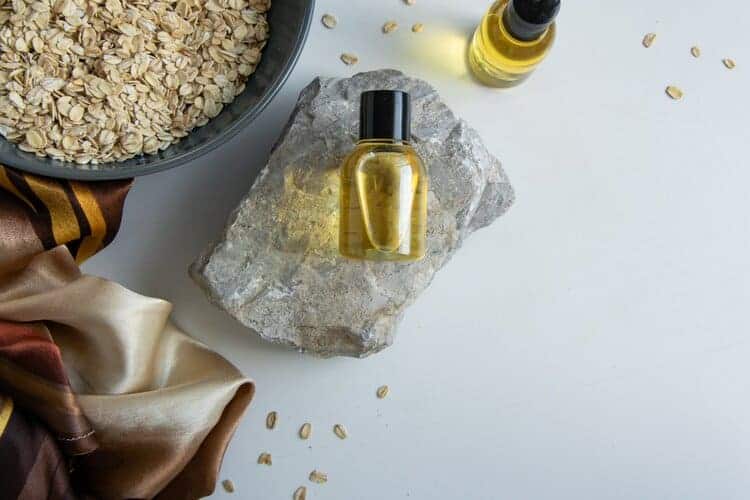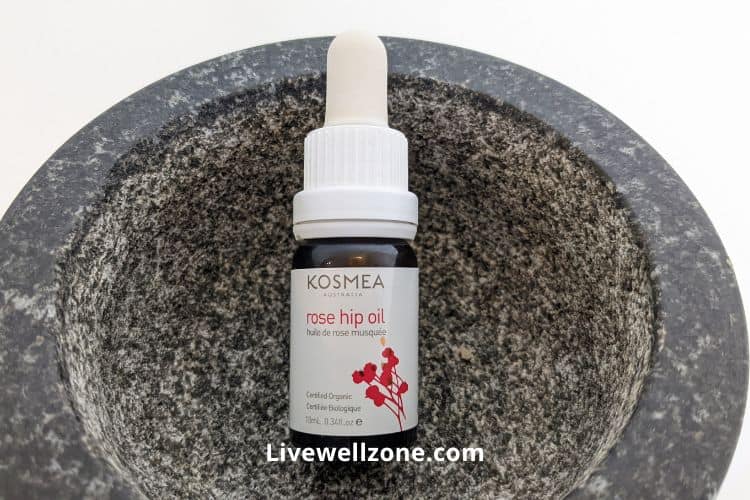
Your skin barrier is a powerful yet delicate part of the body. Not only does it protect you from external danger (such as infections and toxic chemicals), but it also plays a role in maintaining homeostasis (natural balance) within the body (source).
At the same, the skin barrier can be easily damaged by what we’re exposed to (both internally and externally).
Once the barrier has been damaged, repairing it usually involves a holistic approach. One of the components of that holistic approach is face oils
Natural face oils contain nutrients that literally feed and protect the skin, working as an ally to support the skin barrier.
So, in this article we’re going to look at some of the best oils for damaged skin barrier and why you should consider adding them to your beauty routine.
Note: this post contains some affiliate links and I earn a commission (at no additional cost to you) if you use them to make a purchase.
IS OIL GOOD FOR DAMAGED SKIN BARRIER?
One of the main benefits of using oil for a damaged skin barrier is because it doesn’t have any of the chemical irritants found in everyday skincare products. Instead, oils contain nutrients that support the skin in several important ways. For example:
- Preventing water loss: Oils have occlusive properties, meaning that they create a protective barrier on the skin. This barrier allows the skin to retain moisture, thus preventing dehydration and supporting the overall health of the skin.
- Rich in fatty acids: All face oils contain anti-inflammatory essential fatty acids, such as omega-3s and omega-6s. Among these fatty acids, linoleic acid (an omega-6) has been shown to be essential for preventing water loss from the skin. In addition, research shows that those with a compromised skin barrier tend to produce sebum that is low in linoleic acid (source).
- Natural source of vitamin E: All plant oils contain some amount of vitamin E. This vitamin acts as a protectant against environmental pollutants that can damage the skin and its youthful appearance. Additionally, this fat-soluble antioxidant is able to penetrate the deeper layers of skin. This allows it to seal cracks in the skin and protect skin cells from lipid peroxidation (i.e. prevent the lipids in the skin from becoming oxiduzed) (1, 2).
- Rich in antioxidants: Plant oils are a good source of antioxidants that fight free radicals and prevent oxidative damage.
WHICH OIL IS BEST FOR DAMAGED SKIN BARRIER?
1. Oat Oil

Aside from having a good linoleic acid content (36 – 46%) oat oil also has lipids known as ceramides.
These ceramides reside mainly in the top layer of skin and they support the skin barrier by:
- preventing water moisture loss.
- protecting the skin from environmental damage.
Overall, oat oil is a powerful emollient that can help to (source):
- Reduce fine lines and wrinkles.
- Soothe eczema and psoriasis.
- Reduce redness.
- Heal wounds and cracked skin.
Absorption rate: slow.
Skin types: all, especially dry, sensitive and inflamed skin.
2. Safflower Oil
This silky plant oil has a high linoleic acid content (70%) that helps protect and strengthen the skin barrier.
This makes it useful for:
- Inflamed skin conditions that are worsened by a compromised skin barrier.
- Itchy, rough patches that result from specific skin issues.
- Shielding the skin from environmental pollutants (UV rays, air pollutants, etc.) that cause free radical damage.
- Plumping up the skin and retaining moisture.
Safflower oil’s high levels of linoleic acid can be of particular benefit to acne-prone skin because:
- it is noncomedogenic.
- helps to balance skin sebum levels.
- reduces swollen pimples (acting as an anti-inflammatory.)
Absorption rate: quick.
Skin types: All.
3. Sunflower Oil
Sunflower oil’s composition also has a high level of linoleic acid (64.35%) imbuing it with all the associated skin barrier-repairing benefits (source).
It has gentle, emollient properties that moisturize while simultaneously protecting the surface of the skin so it can regenerate.
Since it’s a natural source of vitamin E it provides antioxidant properties that help (source):
- Prevent premature skin aging.
- Protect skin cells from oxidative stress and environmental pollutants.
- Reverse skin swelling from UV damage.
- Reinforce the skin’s protective barrier.
- Retain moisture.
Absorption rate: medium.
Skin types: All.
4. Wheat Germ Oil
Wheat germ oil is inherently soothing because of its combination of fatty acids, antioxidants and emollient properties. It also has a moderately high linoleic acid content (42 – 59%) which offers skin barrier protection (source).
In addition, wheat germ oil is considered one of the plant oils with the highest amounts of vitamin E, which gives it valuable regenerative properties (source).
Overall, this oil helps to:
- Moisturize and hydrate.
- Promote soft, flexible skin.
- Increase the rate of skin cell rejuvenation.
- Heal wounds.
- counter the signs of aging and skin damage.
Absorption rate: slower than other carrier oils.
Skin types: dry, damaged skin that needs soothing.
5. Hemp Seed Oil
This is a rich oil, with a substantial linoleic acid content (50 – 70%) and high levels of omega-3 and 6. These elements encourage a healthy, youthful complexion by acting as building blocks for the surface of the skin (source).
Specifically, gamma-linolenic acid (GLA) – an omega-6 fatty acid – helps both dry and acne-prone skin, by:
- Encouraging skin cell regeneration.
- Acting as an anti-inflammatory.
In addition, omega-3 fatty acids promote overall skin health by (source):
- Protecting the skin from irritants.
- Strengthening the skin barrier.
- Promoting skin hydration.
Absorption rate: average absorption rate. Leaves a slight oily residue on the skin.
Skin types: All.
6. Grapeseed Oil
Grapeseed oil has a lightweight, gentle nature that makes it ideal for supporting sensitive skin barriers.
Its mix of vitamin E, phytosterols and a high content of linoleic acid (which can range between 66 – 75.3%) load it with healing anti-inflammatory and antioxidant benefits.
On the whole, grapeseed oil helps to:
- Even skin tone.
- Treat acne.
- Promote healthy skin elasticity.
- Protect the skin from damaging UV rays.
Absorption rate: fast absorbing.
Skin types: All, especially oily, acne-prone or sensitive skin.
7. Prickly Pear Seed Oil
This luxurious carrier oil has potent antioxidant and antimicrobial properties that encourage healthy, clear skin.
It also has high levels of linoleic acid (ranging between 49.3 – 78.8%) to help fortify the skin barrier (source).
Together, these properties help:
- Hydrate the skin.
- Prevent acne breakouts.
- Protect from harmful elements in the environment.
Furthermore, prickly pear oil is high in vitamin E, and proven to be an effective carrier oil for delivering nutrients into the skin (source).
Absorption rate: slow.
Skin types: both dry and oily (acne-prone) skin.
8. Rosehip Oil
With rosehip oil, your skin enjoys deep nourishment from carotenoids that stimulate collagen and elastin production.
In addition, rosehip oil is high in antioxidants and unsaturated fatty acids that:
- Counteract inflammation that could compromise the lipid barrier and lead to a weakened skin barrier (source).
- Keep cell walls strong so they remain hydrated.
- Relieve dry, itchy skin.
Rosehip oil has a moderate level of linoleic acid (35.9 – 54.8%) that keeps the skin moisturized and vitamin E, which provides emollient qualities.
Absorption rate: quick..
Skin types: All.
9. Sea Buckthorn Oil

Although sea buckthorn oil is low in linoleic acid it contains high levels of the rare omega-7 fatty acid, palmitoleic acid.
Why is omega-7 important? It is a component of skin lipids that supports wound healing and regenerative processes in the skin’s surface (source).
The sea buckthorn fruit is also rich in carotenoids that give it a bright orange color and help to (source):
- Stimulate fibroblasts (for the synthesis of elastin and collagen).
- Protect against free radical damage.
- Shield the skin from UV radiation.
- Normalize sebaceous glands.
- Enhance the skin barrier’s protective properties.
Absorption rate: average absorption, leaving a satin finish.
Skin types: all. Dry, sensitive, oily, or combination skin.
10. Jojoba Oil
One of jojoba’s most unique properties is its close resemblance to human skin sebum.
In particular, jojoba oil contains wax esters – just like facial skin – which have shown to repair altered skin barriers (source).
Overall jojoba oil helps to:
- Regulate sebum production (a dream-come-true for oily, acne-prone skin).
- Smooth and soften skin.
- Treat sunburns.
- Shield the skin from free radicals.
- Encourage wound healing.
- Improve skin elasticity.
Absorption rate: average absorption rate. Leaves a satin finish on the skin.
Skin types: All.
11. Evening Primrose Oil
This oil has an impressive fatty acid profile known to benefit a range of skin issues (including those that are hormonally related).
It is rich in omega-6 fatty acids, including gamma-linolenic acid (GLA), and contains a high percentage of linoleic acid (72%) (source).
Overall, evening primrose can help to:
- Balance uneven skin tone.
- Relieve dry and itchy skin.
- Improve elasticity.
- Reduce fine lines and wrinkles.
- Improve acne (thanks to it anti-inflammatory and astringent properties).
Absorption rate: very slow.
Skin types: ideal for dry, hormonal or mature skin.
12. Squalane Oil
Derived from sugar cane, olive oil, amaranth and other plants, squalane closely resembles squalene (which is produced by the skin’s sebaceous glands).
Because of this similarity, squalane helps to support the skin barrier.
In addition, squalane is:
- anti-inflammatory.
- non-comedogenic.
- helpful for reducing fine lines and wrinkles.
- lightweight.
Absorption rate: fast.
Skin types: All.
FACE OIL PRODUCTS TO USE FOR SKIN BARRIER SUPPORT
1. Kosmea Organic Rosehip Oil

Produced via CO2 extraction – a gentle, low temperature that helps preserve the delicate constituents – this rosehip oil is a personal favorite.
It is also extracted from the whole rosehip – seed and outer flesh. The outer flesh has significantly higher amounts of beta carotene (which is converted to vitamin A). As a result, expect this oil to have an extra boost of antioxidant properties while still giving you the soothing omega fatty acids and vitamin E that rosehip oil is known for.
This is my ride-or-die rosehip oil and you can get it here.
2. Sea Buckthorn Seed and Berry Oil
Rather than use a sea buckthorn oil that is extracted only from the seed or only from the berry, this oil gives you both in one blend. This allows you to get the full benefit of the carotenoids and fatty acids (3, 6, 7 and 9) that this plant has to offer.
Get this sea buckthorn seed and berry oil.
3. Pure Radiance Oil (Calm) from True Botanicals
Formulated for sensitive skin, this oil is hypoallergenic, non-comedogenic and pregnancy-safe. It brings together many of the oils we’ve covered, such as:
- Safflower.
- Jojoba.
- Hemp seed.
- Grapeseed.
- Sunflower.
In addition, this oil is infused with calendula, a plant that has traditionally been used to soothe sensitive or delicate skin.
To round out the formula, there are other soothing oils like cucumber seed, raspberry seed and squalane.
CONCLUSION
There are multiple factors that can contribute to skin barrier issues.
For example, harsh skin care products can slowly and steadily damage the skin. In other cases, things like diet and overall health status may be causing the skin damage.
Whatever the underlying cause of skin barrier damage, it is essential that you identify it so that you can start making changes.
Overall, carrier oils should be used as part of a holistic approach to soothe and nourish your skin.
You Might Also Enjoy:
What To Mix (And Not) With Rosehip Oil For Face – The Ultimate Guide
Best Oils for Acne Prone Skin: Carrier, Essential and Cleansing Oils You Shouldn’t Ignore
Carrier Oils By Skin Type: How to Choose and Simple List for Beginners
Best Carrier Oils for Sensitive Skin: 10 Oils To Soothe Dryness, Acne, Cracked Skin & More
Non-Greasy Carrier Oils For Skin: 10 Oils To Fall In Love With
How To Add Rosehip Oil To Your Skin Care Routine: Quick Tips To Follow
Rosehip Oil vs Jojoba Oil for Face (And Body): Which is Better and How To Use

